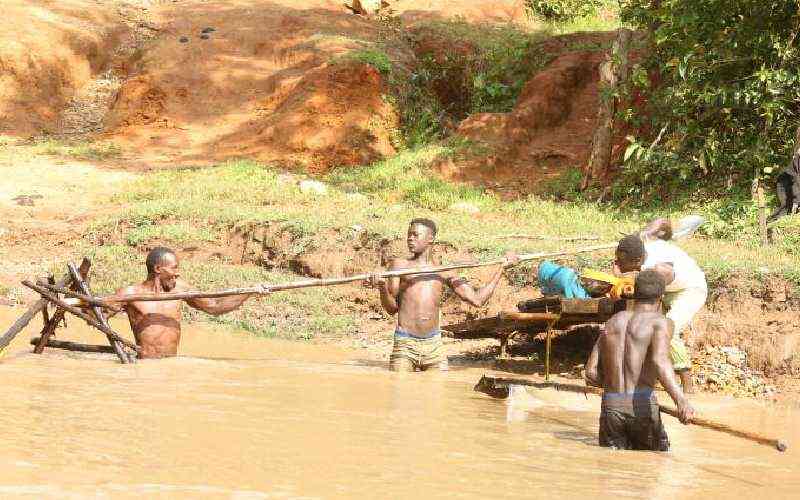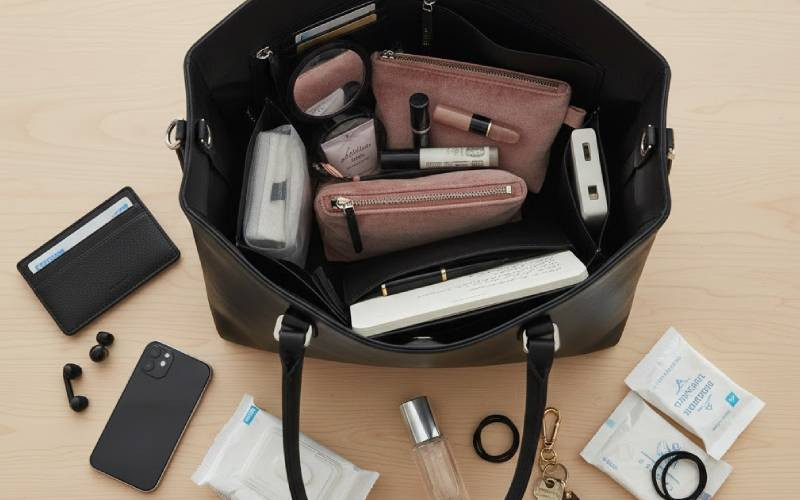
Eric Bulinda and Bryson Ambani leads their colleagues in process of looking for deposits of gold in river Isiukhu on September 16, 2022. [Benjamin Sakwa, Standard]
The four energetic young men prospecting for gold work the river bed in pairs. Two appear to be standing on the floor of the river, submerged in water up to their waists. The other two remain on the river bank holding receptacles into which sand and mud scooped from the river bed are thrown by those in the river.
They watch us silently as we approach them. Moments later, one of the men in the river suddenly vanishes from sight only to reappear below our feet, and all smiling. He then goes back to his work as if nothing had happened.
The artisans stand on completely submerged, sturdy three-legged wooden ladders placed on the floor of river Isiukhu to give them elevation. That makes it easy for them to scoop sand and mud from the river using spades mounted on long wooden stakes.
"I am sure you thought he was standing on the river bed, but he wasn't. At this point, the river is intense. You might have noticed that the two guys in the river hardly move or change positions," Lucas Amwayi says with a grin. He is used to his colleagues playing pranks on people who stop by to watch them at work.
The men in the river dig up sand and mud and throw it into perforated plastic basins held by those on the river bank. Water is added to the mixture and stirred vigorously to separate river stones from the muddy mixture that is collected on metal basins below the plastic receptacles.
More water is poured into the mixture and stirred to wash away the mud and sand. After that, what remains is placed on a sieve made from woven cloth onto which more water is poured to aid the purification process.
The sieve retains fine particles later dried in the sun and a magnet is used to extract tiny black impurities, leaving behind pure gold. A whole day's work yields only an ounce or two of gold.
"Gold extracted from the river bed has higher monetary value than that found in underground goldmines. Gold taken out of rivers is pure and lighter in colour. It does not require mixing with mercury to improve its grade like gold from underground mines," Eric Bulinda, one of the artisans we found in the river, says.
"We sell an ounce of gold to local buyers at Sh5,000. The buyers then take it to international buyers in Eldoret, Kisumu or Nairobi," he says.
Bulinda embodies the frustration of educated youth who cannot secure white-collar jobs despite having acquired a good education. He graduated from Masinde Muliro University of Science and Technology with a Bachelor of Education degree in 2018. He has not been lucky to find formal employment.
"On three different occasions, I was hired by boards of management of schools around here and taught for some time before calling it quits. Getting paid was a struggle, yet I have a family to feed," he says.
The other miners, Bryson Ambani, Sylvester Achimwa, and Anthony Shikumbi, have modest education and spend most of their time searching for gold in the fast-flowing river. Whatever they get takes care of their daily needs.
"We do not make much when the water levels are high. We make good money during the dry season when water levels are down, making the river bed easily accessible," Ambani says.
A lot of patience
Achimwa says: "This work is tedious and requires a lot of patience. We are always on the lookout to avoid snake bites. Sometimes, we slip off the ladders and get hurt. Drowning is the least of our worries because we know how to swim."
On the whole, the search for gold is practised on a much smaller scale along big rivers. Nevertheless, the name "Ikolomani" comes to mind every time gold is mentioned in Kakamega. Ikolomani is a Luhya corruption of the English word "goldmine".
Unfortunately, though, any time Ikolomani is in the news, it is about people dying or being buried alive in a collapsed mine shafts while prospecting for gold. The last such incident was recorded in May 2021 when five villagers were buried alive in a mining accident in Bushiangala village.
Ikolomani sub-county police boss Joseph Chesire attributed the accident to heavy rains that were pounding the area at the time. Most of the unsafe goldmine tunnels were left uncovered by the colonial government that used to prospect for the precious metal in pre-independence times.
Many deaths
The quest for gold in Ikolomani, as in other parts of the country, has left many deaths in its wake. Artisans who patronise the Ikolomani goldmines do so at great risk to their lives. The shafts are not protected and many times the walls have collapsed while miners were in the tunnels. Sometimes, the use of generators that discharge carbon dioxide inside mine shafts has resulted in lack of oxygen, leading to deaths.
To regulate the mining industry, Ikolomani MP Bernard Shinali drafted the Gold Processing Bill 2021. The Bill proposes the establishment of a gold refinery and regulatory agency. Already, plans are underway to set up a gold refinery at Lidambitsa in Kakamega to serve Siaya, Migori, Kisii, Vihiga and Kakamega counties.
Untapped goldmines along the Lirhanda corridor that spans these counties are thought to hold 1.31 million ounces of gold with an estimated value of Sh171 billion.
 The Standard Group Plc is a multi-media organization with investments in media
platforms spanning newspaper print
operations, television, radio broadcasting, digital and online services. The
Standard Group is recognized as a
leading multi-media house in Kenya with a key influence in matters of national
and international interest.
The Standard Group Plc is a multi-media organization with investments in media
platforms spanning newspaper print
operations, television, radio broadcasting, digital and online services. The
Standard Group is recognized as a
leading multi-media house in Kenya with a key influence in matters of national
and international interest.


